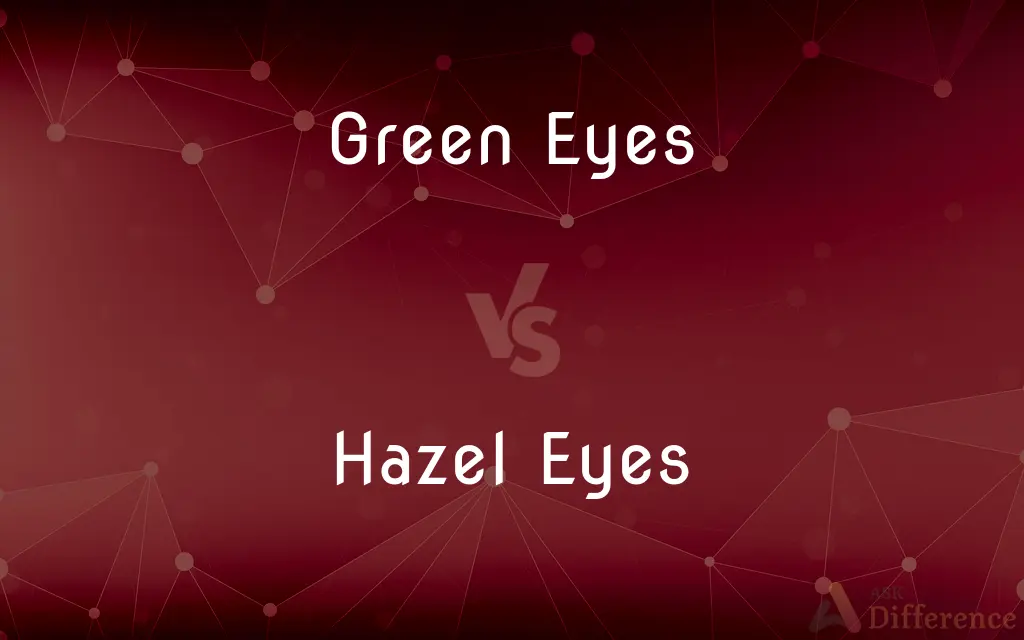Green Eyes vs. Hazel Eyes — What's the Difference?
By Tayyaba Rehman — Published on November 1, 2023
Green Eyes are predominantly green, while Hazel Eyes display a mix of colors, often brown and green, with gold or amber specks.

Difference Between Green Eyes and Hazel Eyes
Table of Contents
ADVERTISEMENT
Key Differences
Green Eyes, as the term implies, refer to eyes that have a green hue. This greenish tint can range from a pale to a more intense shade, depending on the individual. Hazel Eyes, on the other hand, are characterized by a combination of colors, with brown and green being the most dominant. These eyes often have a multicolored appearance.
The uniqueness of Green Eyes lies in their monochromatic shade, where green is the primary and dominant color. Green Eyes can be striking due to their rarity, as they make up a small percentage of the global population. On the contrary, Hazel Eyes showcase a blend of colors, making them distinct and often hard to categorize. The combination of colors can shift based on lighting and the surrounding environment.
Another notable difference between Green Eyes and Hazel Eyes is the distribution of melanin and the way light scatters in the eyes. Green Eyes have a moderate amount of melanin, which combined with the Tyndall effect, results in a green hue. In contrast, Hazel Eyes contain more variation in melanin distribution, which gives them their characteristic blend of colors.
From a genetic standpoint, both Green Eyes and Hazel Eyes can be influenced by multiple genes. The inheritance pattern is complex, and while certain genes may play a significant role, the exact combination leading to these eye colors remains a subject of research.
In essence, while both Green Eyes and Hazel Eyes are unique and captivating in their own right, they differ mainly in color composition, with the former being primarily green and the latter showcasing a mix of colors.
ADVERTISEMENT
Comparison Chart
Primary Color
Green
Mix of colors (brown, green, gold)
Melanin Distribution
Moderate
Varied
Commonality
Rarer
More common than green
Appearance
Solid green hue
Multicolored with specks
Genetic Influence
Influenced by multiple genes
Influenced by multiple genes
Compare with Definitions
Green Eyes
Often associated with mystery, Green Eyes can range from pale to vivid shades.
The protagonist's Green Eyes were mentioned frequently in the novel.
Hazel Eyes
Like green, Hazel Eyes are a product of complex genetic influences.
The twins had identical Hazel Eyes, a family trait.
Green Eyes
Characterized by a moderate amount of melanin, Green Eyes result from the Tyndall effect.
His Green Eyes stood out in the dim room.
Hazel Eyes
Hazel Eyes can shift in perceived color based on the surrounding environment and lighting.
In the candlelight, her Hazel Eyes seemed to glow.
Green Eyes
Green Eyes are ocular organs showcasing a predominantly green hue.
Her Green Eyes sparkled in the sunlight.
Hazel Eyes
Resulting from varied melanin distribution, Hazel Eyes often appear multicolored.
His Hazel Eyes always drew attention at parties.
Green Eyes
Genetically complex, Green Eyes are influenced by multiple genes.
Their child inherited Green Eyes from both parents.
Hazel Eyes
More common than green but unique in appearance, Hazel Eyes are hard to categorize.
People often debated the exact shade of his Hazel Eyes.
Green Eyes
Among eye colors, Green Eyes are relatively rare globally.
She was proud of her distinct Green Eyes.
Hazel Eyes
Hazel Eyes display a blend of colors, primarily brown and green, with potential gold specks.
Her Hazel Eyes changed hues under different lights.
Common Curiosities
How do Hazel Eyes differ from other eye colors?
Hazel Eyes have a mix of colors, often brown, green, and sometimes gold or amber.
Are Green Eyes rare?
Yes, Green Eyes are rarer than other eye colors like brown and blue.
Can two brown-eyed parents have a child with Green Eyes?
While less common, it's possible due to the complex genetics of eye color.
What color are Green Eyes?
Green Eyes have a predominantly green hue.
What causes the green color in Green Eyes?
The green hue results from a moderate melanin level combined with the Tyndall effect.
Why do Hazel Eyes sometimes appear to change color?
The perceived color shift in Hazel Eyes is due to lighting and the surrounding environment.
Are Green Eyes only green in color?
Predominantly yes, but shades can range from pale to intense green.
Is it easy to categorize Hazel Eyes?
No, due to their multicolored nature, Hazel Eyes can be hard to categorize.
Can Hazel Eyes be blue and brown?
While Hazel Eyes typically mix green and brown, some variations can appear bluish-brown.
Why do some people classify their Hazel Eyes as green or brown?
Since Hazel Eyes blend colors, their dominant hue can appear more green or brown to some.
Can eye color change over time?
While eye color is generally stable, some Hazel Eyes may seem to shift due to environmental factors.
Are Hazel Eyes more common than Green Eyes?
Yes, Hazel Eyes are more prevalent than Green Eyes.
Do Green Eyes originate from a specific region or ethnicity?
Green Eyes can be found globally but are more prevalent in some European populations.
Share Your Discovery

Previous Comparison
Abstract Noun vs. Collective Noun
Next Comparison
Social Cognitive Theory vs. Social Learning TheoryAuthor Spotlight
Written by
Tayyaba RehmanTayyaba Rehman is a distinguished writer, currently serving as a primary contributor to askdifference.com. As a researcher in semantics and etymology, Tayyaba's passion for the complexity of languages and their distinctions has found a perfect home on the platform. Tayyaba delves into the intricacies of language, distinguishing between commonly confused words and phrases, thereby providing clarity for readers worldwide.












































